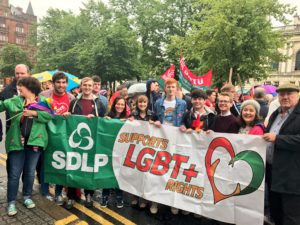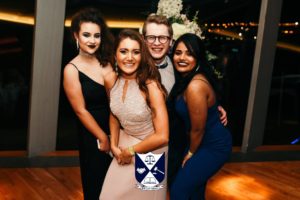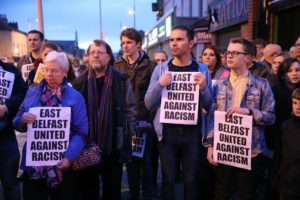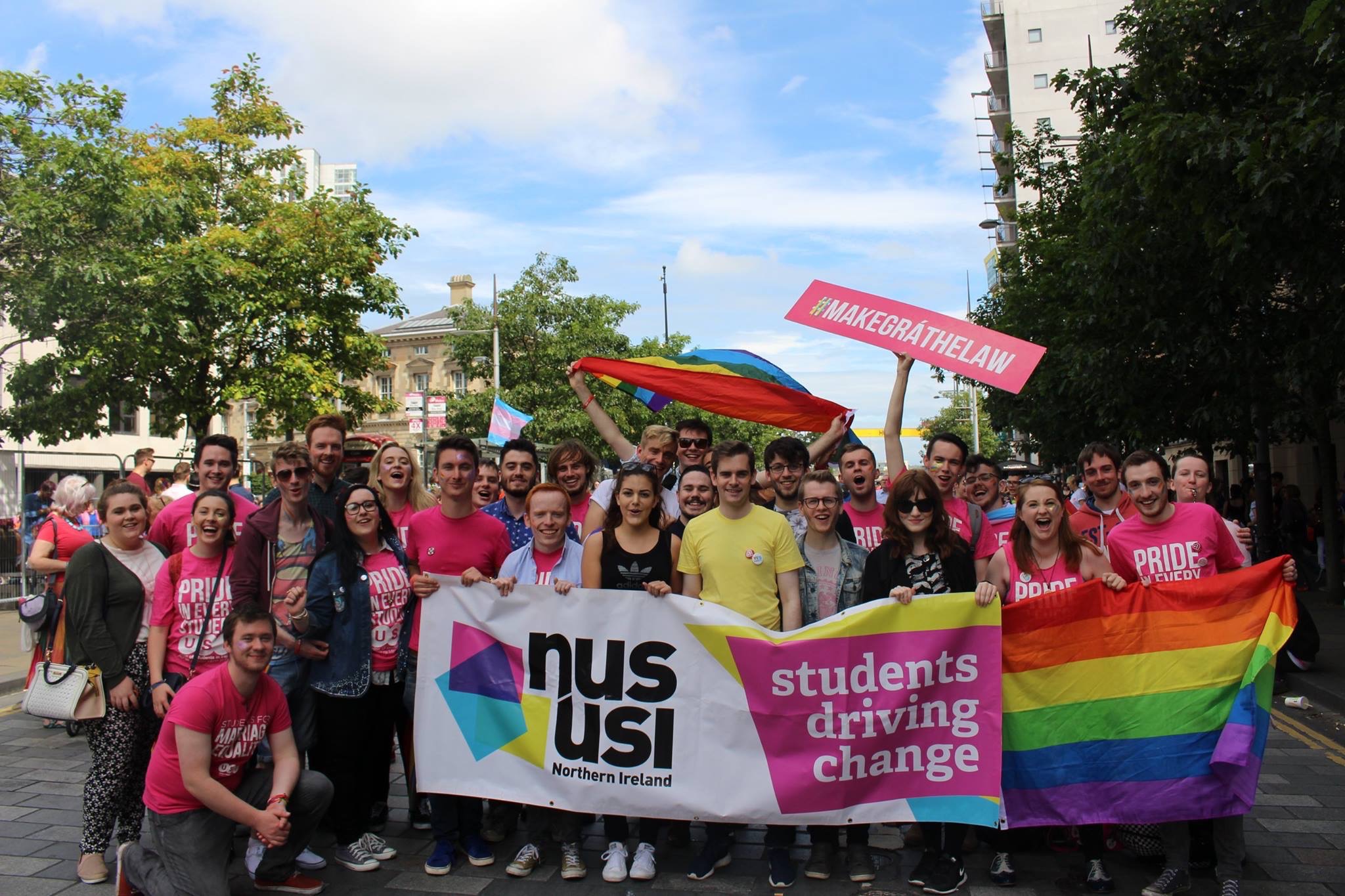As we reflect on the 20th anniversary of the Good Friday Agreement, Northern Slant is running a feature series on identity and stereotypes in Northern Ireland. This week Alina Utrata interviews Matthew Carson. You can follow him on Twitter @matthewcarson.
Matthew Carson is from Northern Ireland, and his identity is complicated. But then again, Matthew thinks, that’s true for everyone.
“I don’t necessarily think that this is a Northern Ireland only phenomenon,” Matthew said. “I don’t think that we’re unique in our uniqueness.”
The QUB Law student, currently studying abroad in Spain, has a long list of words that could describe his identity.
 “I’m Irish, I’m a Protestant, I’m gay, I’m British, I’m working class, I’m a European,” Matthew said. “I’m all of those things in different measures at different times . . . If I left out some of [those] and told you that I’m a Protestant working class male from East Belfast . . . maybe you wouldn’t have guessed that the missing details are ‘Irish, gay, European, SDLP member.
“I’m Irish, I’m a Protestant, I’m gay, I’m British, I’m working class, I’m a European,” Matthew said. “I’m all of those things in different measures at different times . . . If I left out some of [those] and told you that I’m a Protestant working class male from East Belfast . . . maybe you wouldn’t have guessed that the missing details are ‘Irish, gay, European, SDLP member.
“What I’m interested in the world knowing about me isn’t necessarily contained in those discrete identities because I think taking each of them separately hides more than it illuminates about me.”
When Matthew was growing up, establishing his own identity was not motivated by the question of the Northern Irish constitutional arrangement.
“I think that realising I was gay when I was around 15 was the key thing which shattered for me the illusion that I needed to stay within the prescribed lines of identity in Northern Ireland,” Matthew explained. “After the occasionally tumultuous internal journey of realising you’re different, realising you’re gay, and choosing to come out to everyone within a year, the decision to join a political party or get a new passport or support a different constitutional arrangement on a small island seems less significant.”
Matthew realised that he could count on his family and chosen friends to support him to chart his own course, whatever he decided. So, Matthew joined the SDLP.
“I think people in my community would be surprised to learn that I didn’t excise my British/Protestant cultural identity from my body when I joined the SDLP, or when I got an Irish passport, or when I voted Remain, or when I decided that the long term interests of everyone in Northern Ireland would be best served by one state on this island,” Matthew said. “I still feel in part at least, British. I still feel associated with bonfires and parades and all of that because they were part of my formative years. I would never try to hide that or minimise that part of my identity.”
 Matthew says he doesn’t really worry that much about fitting in, but tries to assume that he will be accepted with any group as long as he is honest about being himself. The approach has worked so far.
Matthew says he doesn’t really worry that much about fitting in, but tries to assume that he will be accepted with any group as long as he is honest about being himself. The approach has worked so far.
“Of course, I’ve gotten called a Lundy and a West Brit more times than I can count, but always as a bit of craic and never as a serious insult,” Matthew commented. “People in our part of the world are infinitely more tolerant and understanding than the Nolan Show would have you believe.”
For Matthew, the political parties do broadly work to represent the interests of Northern Ireland—Matthew feels represented by his own SDLP, but also finds common ground with Alliance and the Greens. In his view, it is broadcast media that often portrays an extreme view of people’s opinions.
“I think in general we are well served by high quality print journalism,” Matthew says, “I don’t see our broadcast media in such a positive light. I’m loath to turn this into another rant about the Nolan Show . . . but I just have to say briefly that his show does a poor job representing anyone apart from the extremes of politics in NI, and I do believe it serves only to stir up tension and pick at wounds of the past. I think our media has to realise that it isn’t a passive observer when it comes to the peace and reconciliation process, and actually should be an active participant in copper fastening the process.”
For Matthew, real harm has come from the fact that the question of nationality eclipses other issues in politics, such as class.
“I think it’s worth having this discussion again in light of the DUP relying on a working class base to elect 10 MPs to Parliament who then prop up an austerity focused Conservative government,” Matthew said. “I don’t raise this as a way of castigating unionist working class voters but rather to call for nationalist, left wing parties like my own to look at ourselves seriously and ask ourselves how we expect to persuade a section of the Protestant/Unionist population to vote for Irish unity and constitutional change on this island when we’re currently unable to persuade significant numbers of this community to vote for us instead of right wing parties who are gleefully helping the Tories strip back the welfare state and the health service.”
As the existence of local political parties and local politics demonstrate, Northern Ireland is a unique place.
“I do think our people are a bit different from those in the rest of these islands,” Matthew explained. “I think a foreign tourist coming to Belfast would experience something different to someone going to Dublin or Cork. . . .What makes that concept surprising to outsiders is that the story of Ireland as told to people around the world is that everyone on the island is the same – tri-colours, glasses of Jameson, and an ingrained desire to kick the Brits. I think lots of people would be surprised to know that within our island and within our country, there are people who prefer Union Flags, glasses of Bushmills, and have a deeply held and cherished British identity.”
But with that uniqueness comes unique challenges.
 “Suicide deaths since 1998 have now outstripped the total number of people killed during the whole of the Troubles, and people who live in the North face much higher rates of mental health problems than elsewhere across these islands.”
“Suicide deaths since 1998 have now outstripped the total number of people killed during the whole of the Troubles, and people who live in the North face much higher rates of mental health problems than elsewhere across these islands.”
But for Matthew, these problems aren’t hopeless.
“If [a US Special Envoy came to Belfast today] I would take them to the top of the Cave Hill on a clear day and show them the stunning view of all of the city I call home,” Matthew described. “I’d show them how small the city really is, and how lucky we are to be so proximate to nature and open countryside. I’d show them how we live in relative peace in every part of the city now after the heroic efforts of those involved in the Good Friday Agreement.”
Matthew thinks that addressing identity and stereotypes is one of the challenges Northern Ireland currently faces.
“I don’t know anyone who fits 100% into any stereotype or label,” Mathew said. “I actually think one of the problems we have in Northern Ireland is that we’re very ready to discard someone’s views once we’ve identified that part of their identity ‘clashes’ with ours. We can all be better at listening – we have to be.”
For now, Matthew tries to be honest about his own story and identity.
“I try my best not to fill in the blanks with the easy answers about other people, even though I don’t always succeed at this,” Matthew admitted. “Secondly, I try my hardest to be open and up front about as much of my identity as is possible with people I meet. By doing this, I get to tell my own story about who I am and where I come from, rather than leaving it to others to come to conclusions.”
Looking towards the anniversary of the Good Friday Agreement, Matthew sees a challenge for the future.
“We’ve secured the peace,” Matthew said. “We should all enjoy a period of back slapping and self congratulation about our historic, remarkable achievements as a society.
“But the truth is, we have no government to confront the mental health crisis or any of the other problems we are facing. Our collective appetite for power sharing and devolution is declining. The job of all of us to get the show back on the road, and fill the political vacuum with ideas as big and bold as the Good Friday Agreement was 20 years ago.”

